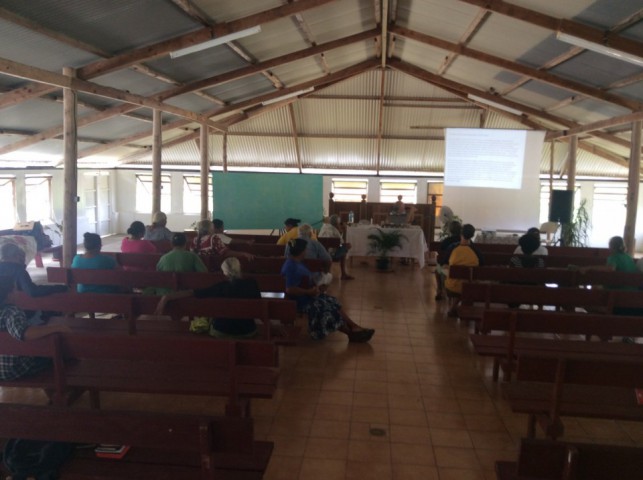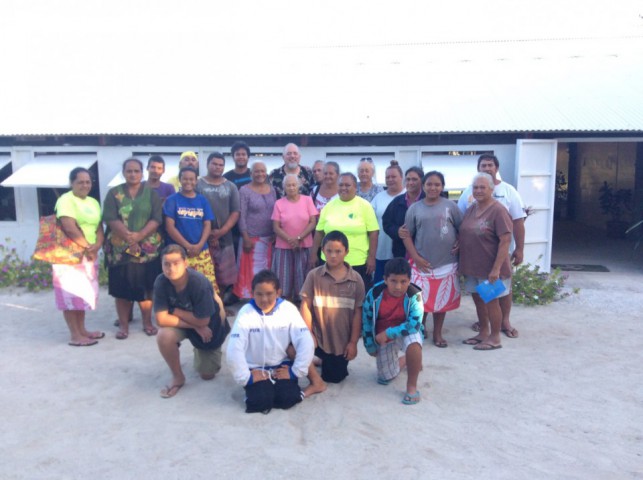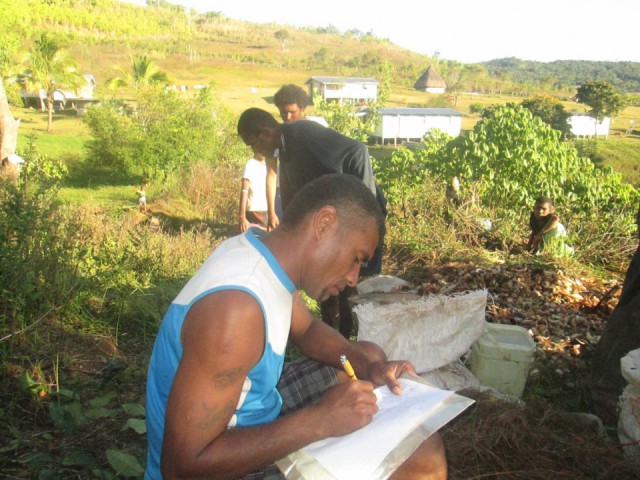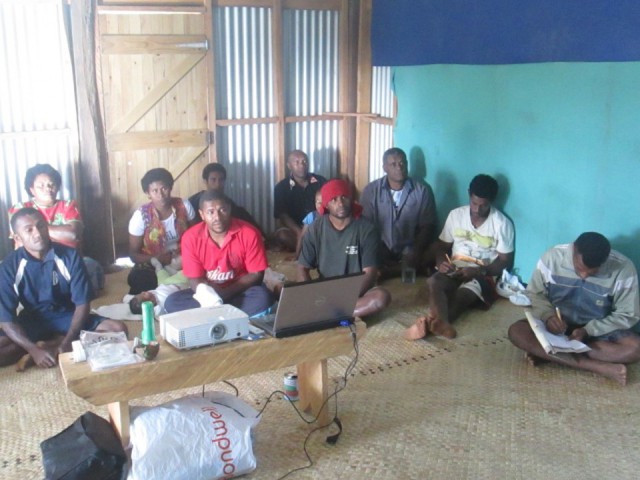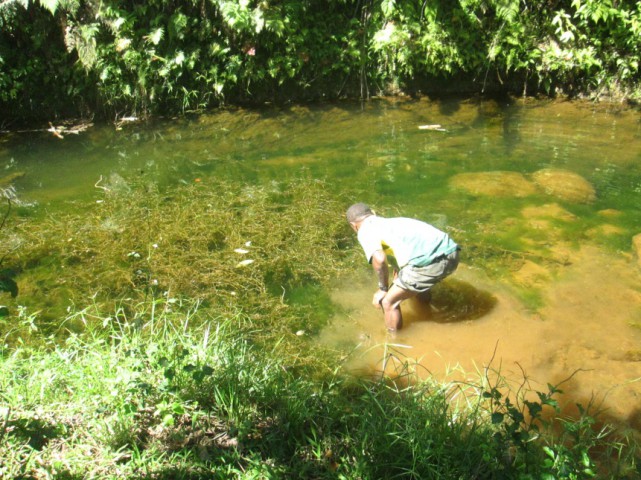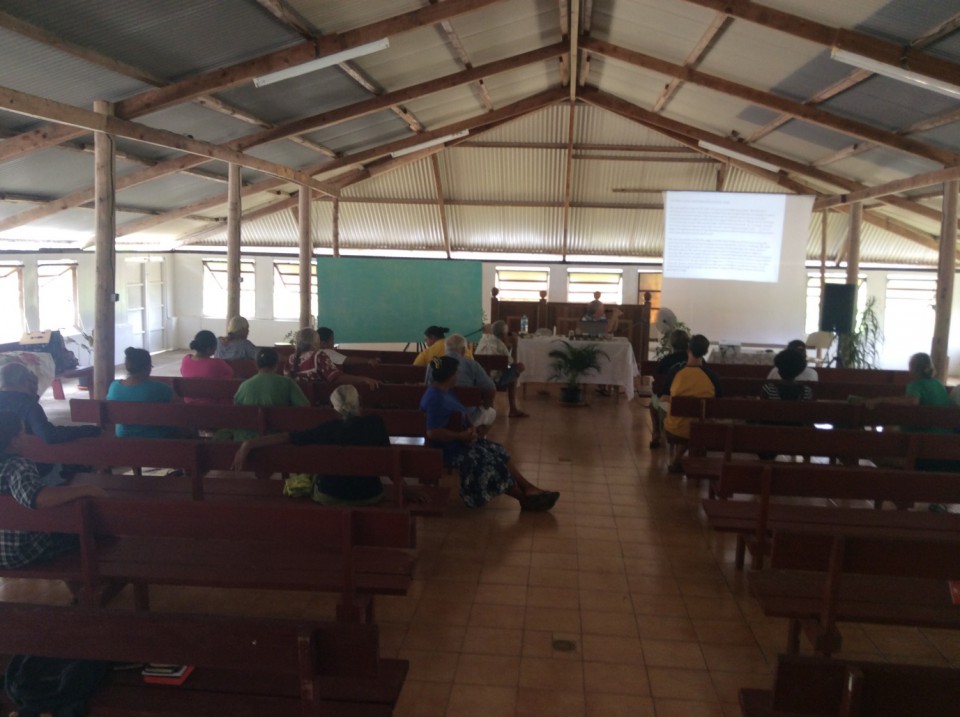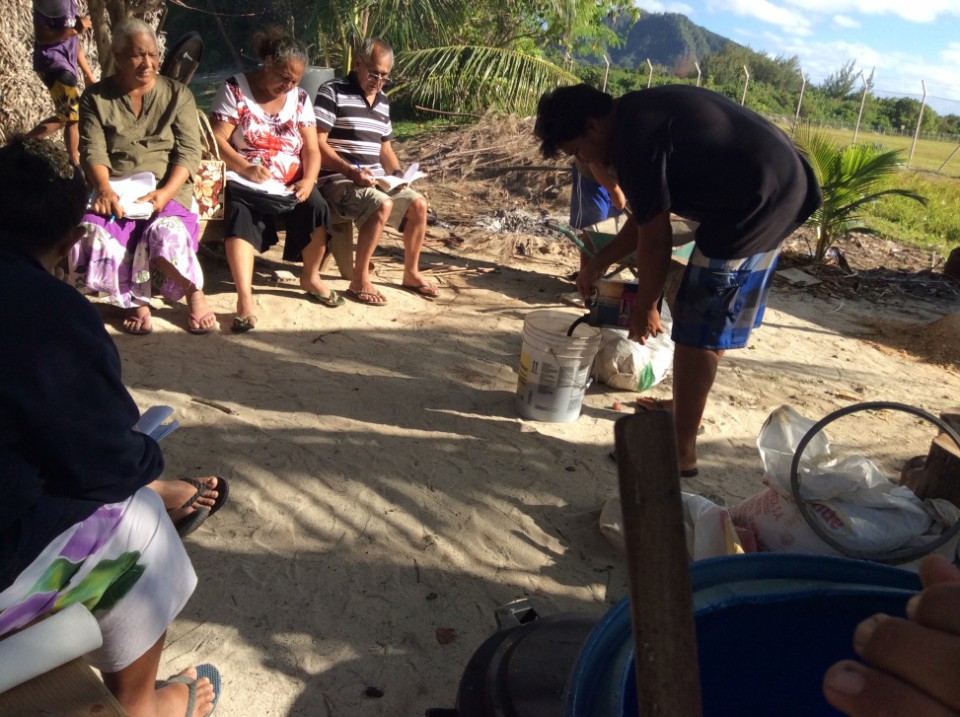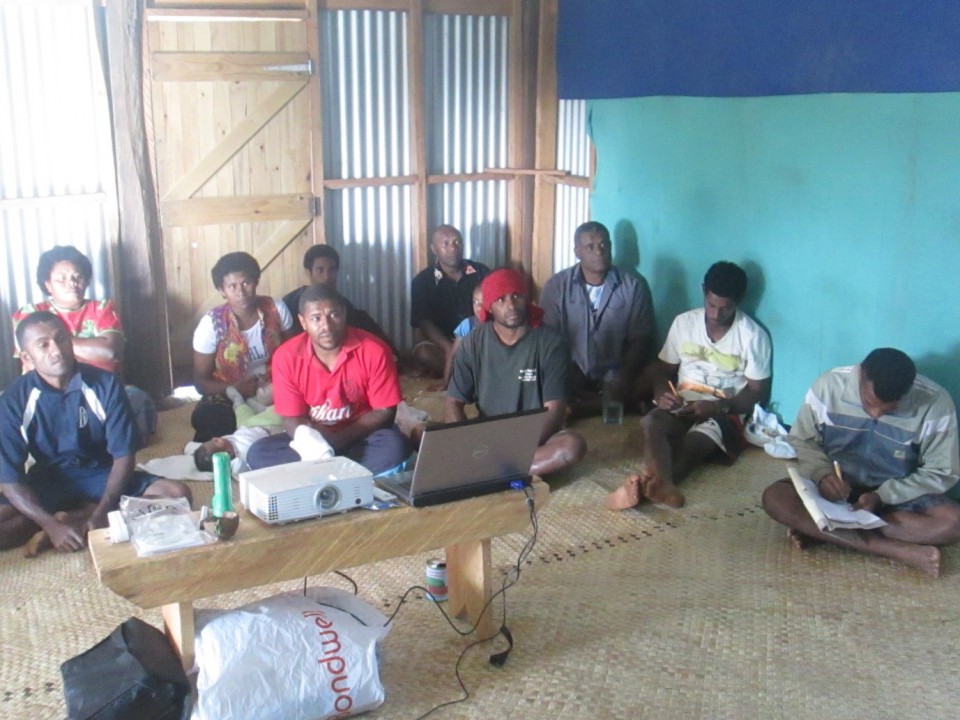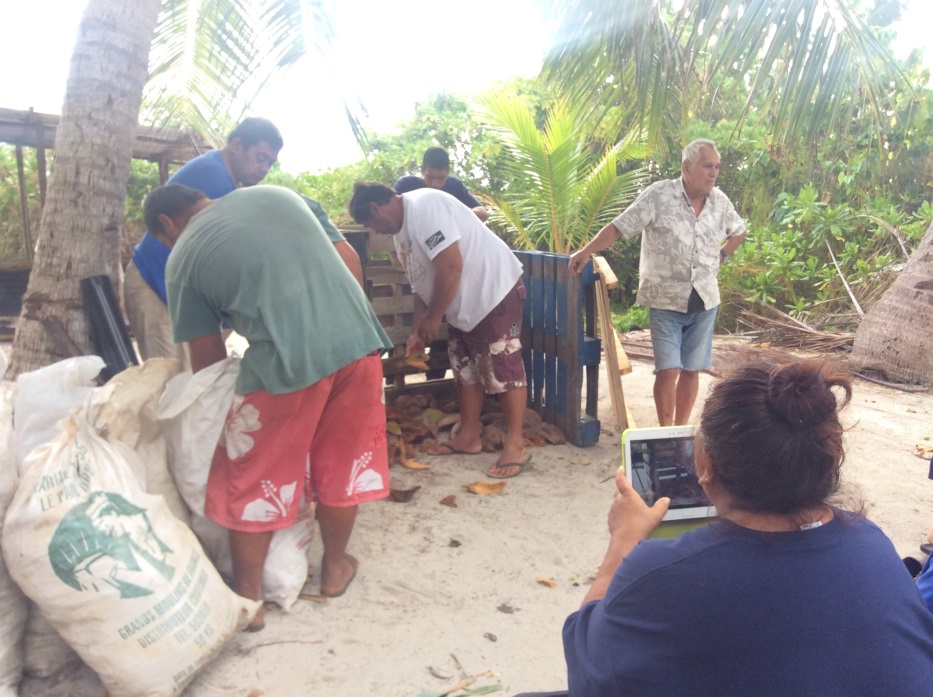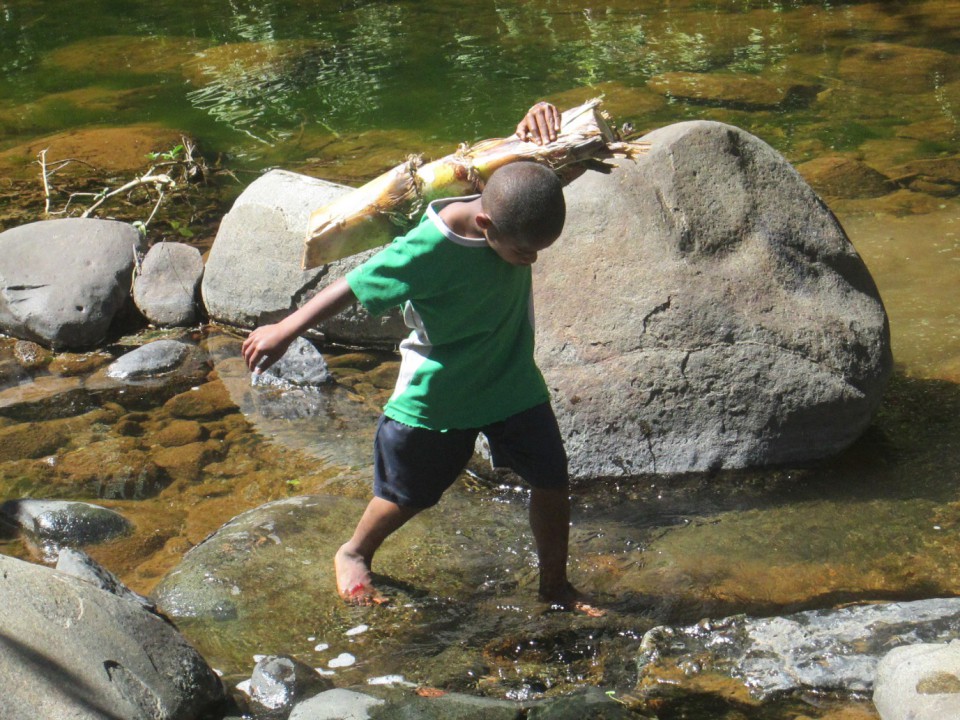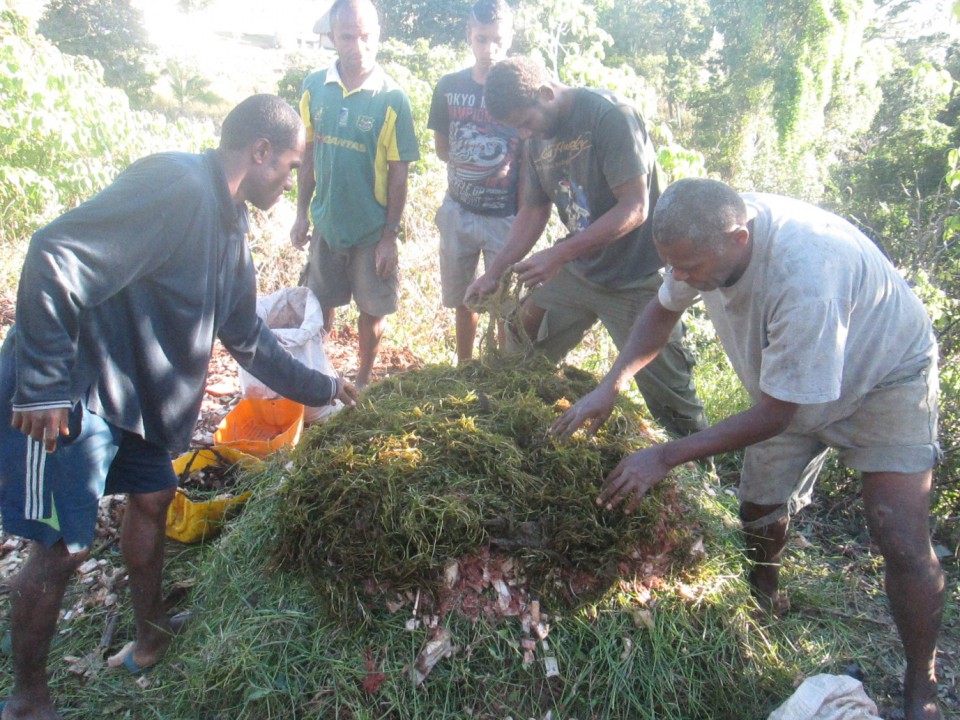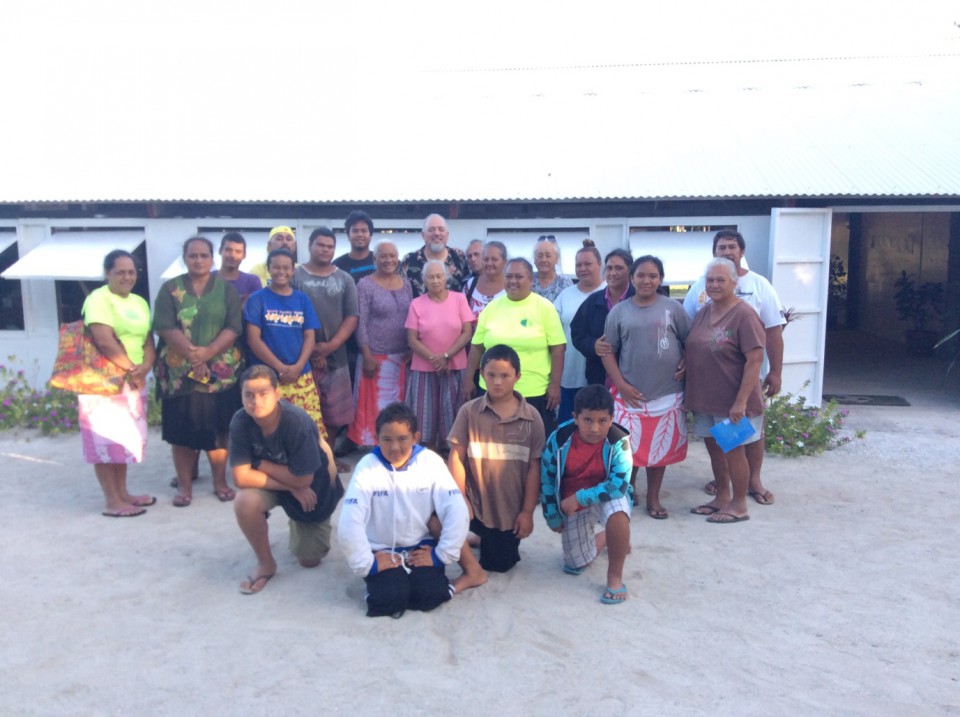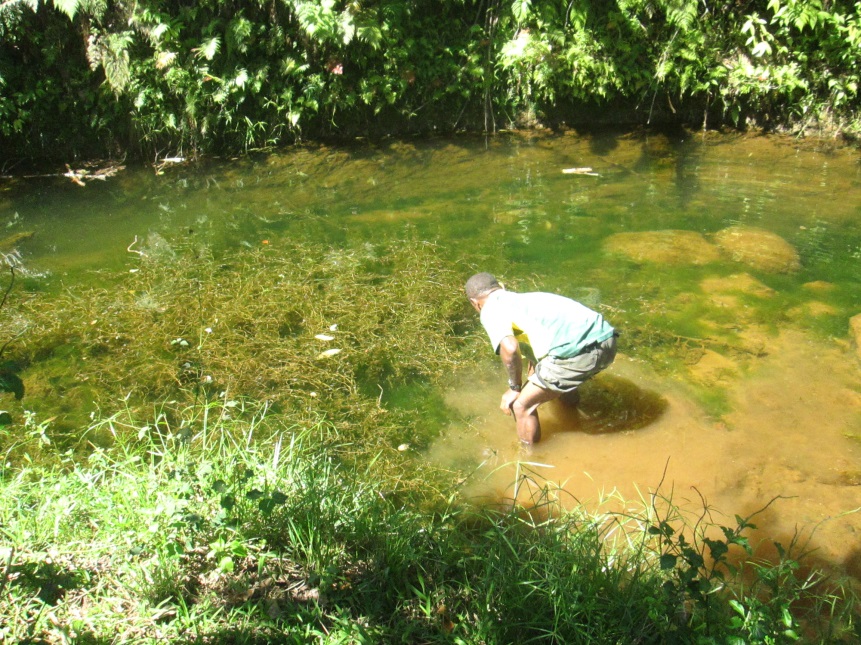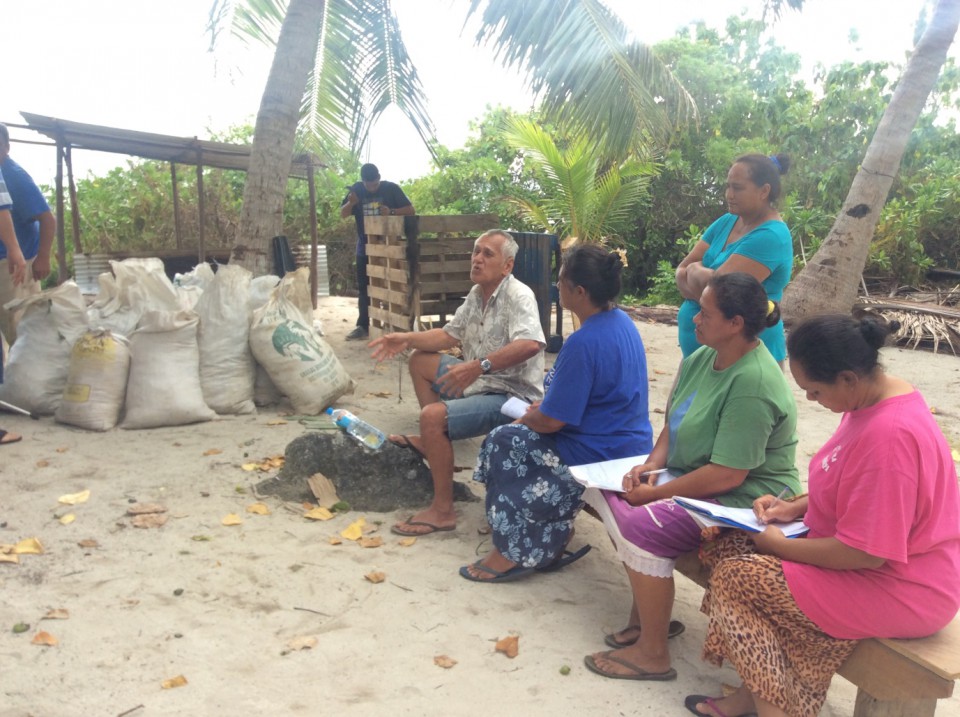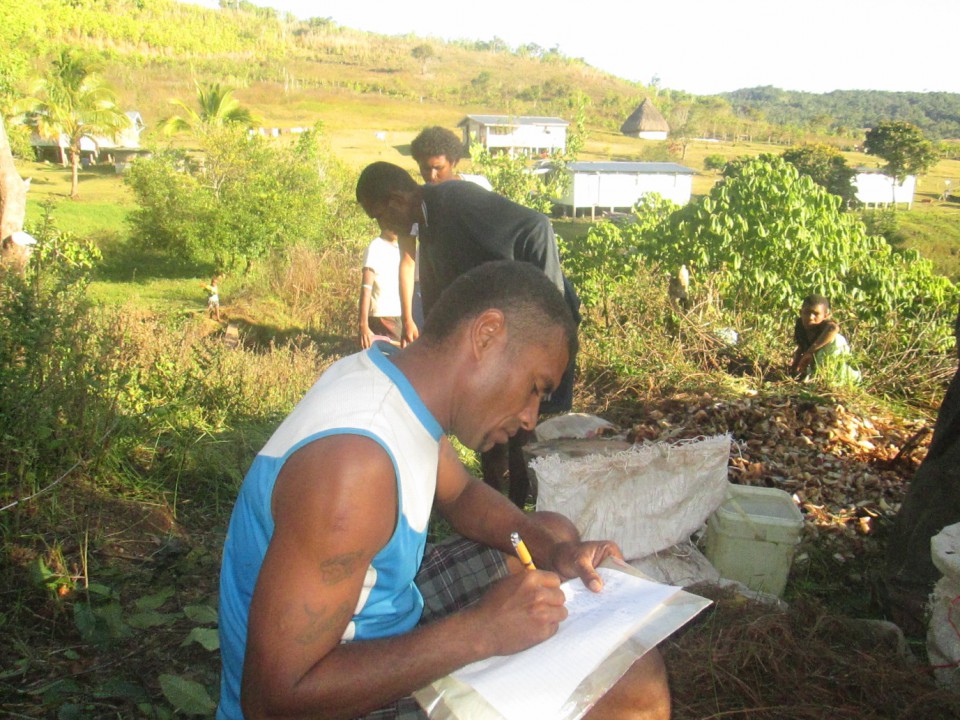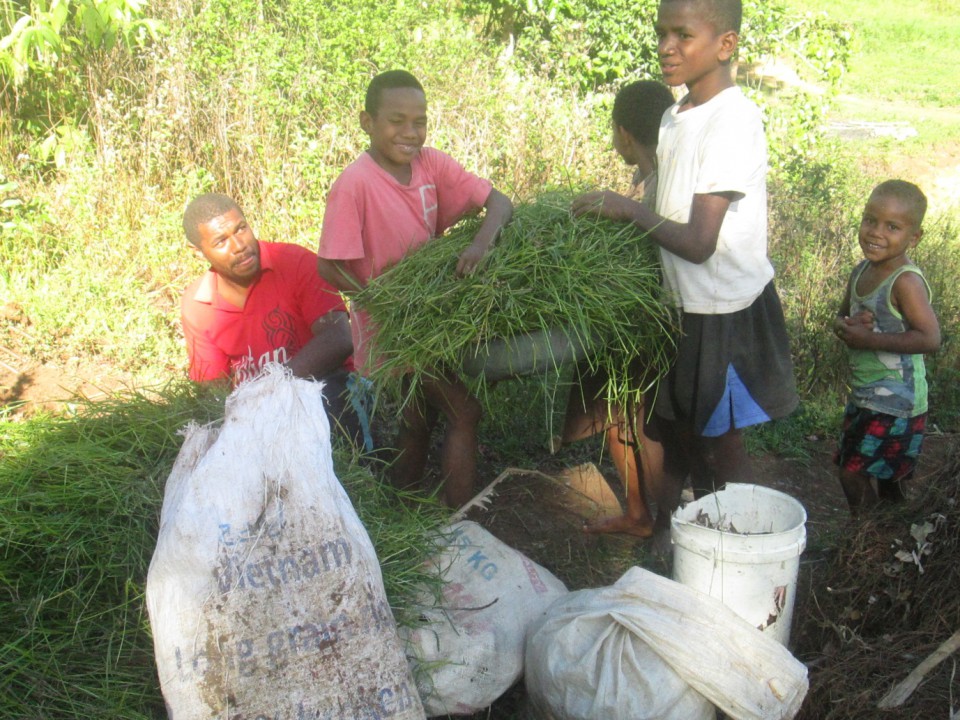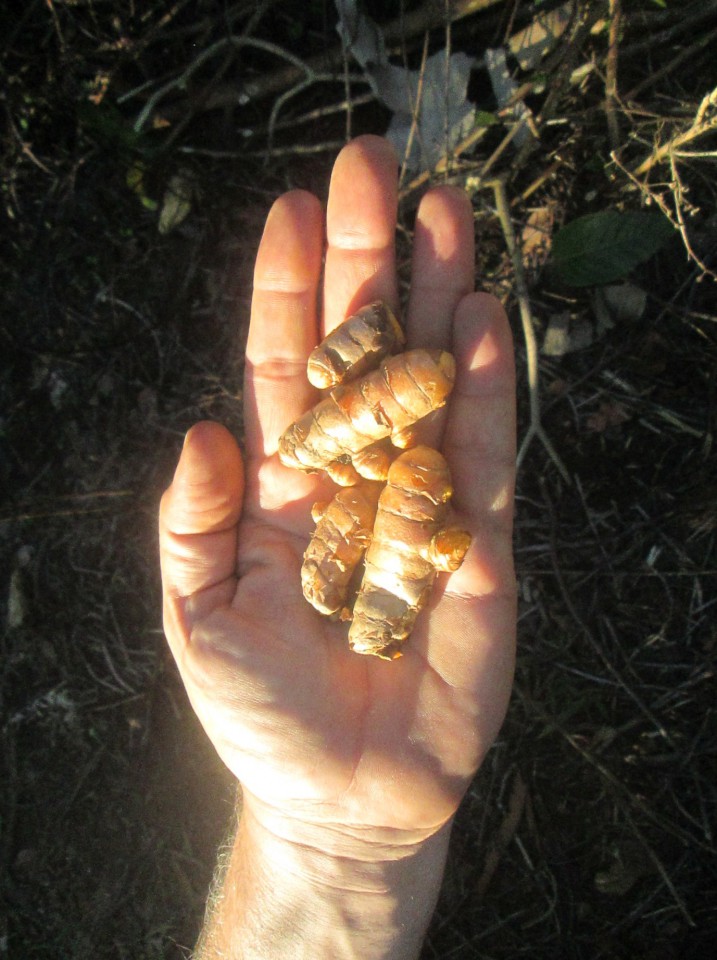AUC WELFARE DEPARTMENT ASSISTANCE TO SOUTH PACIFIC UNION WELFARE DEPARTMENT REPORT – John Lausevic
Huahine Island, Tahiti August 2-7,2015
Throughout all the South Pacific Islands the call for aid and assistance is great. With cyclones, tsunamis and Global Warming a great concern among the peoples of these islands is gardening as it provides their only source of food and income. After patiently waiting for more than two years for a visit from the Welfare Department of the Australasian Union, the people were given help in the form of a hands-on, agriculture-based seminar. The focus was mainly on the improvement of their soils and on training workshops. A four-day workshop was held on Huahine Island, Tahiti, where a group of attendees were waiting my arrival. Thirty years have passed since I first travelled to this particular island, and few things had changed since my original visit. Another thing that was needed was improvement in my French-speaking ability. I found myself shy in the use of French due to a lack of use. I had all but forgotten basic vocabulary words. But after a day the brain cells rejuvenated, and the words started to flow again. Translation was provided into Tahitian and French by various translators.
Above Photo: Attendees inside Camp Chapel of Huahine Island – Tahiti
It was quite interesting to see the very special way one is greeted here, like royalty. Other arriving passengers might get one garland of fresh and fragrant flowers; however, when friends and church members know that anyone is coming, that particular visitor or visitors will receive so many that others stop to stare in wonder. Likewise on departure one is given a Tahitian customary send-off in the same fashion, however, with necklaces of shells as a form of saying bon voyage.
A majority of church members on Huahine Island are self-supporting market garden farmers. Their livelihood depends on their farm production with many sisters operating the farm businesses. They all sell locally to the one supermarket and farmers markets. The invitation was given out in advance, and some local farmers from the district came. Included in the attendees were several men one of which was the owner of a local 3-star hotel which had its own vegetable garden supplying the hotel kitchen and his head gardener. A local New Zealander even came with the interest in improving his soil. Other attendees were a man from Switzerland and another lady from an Indian Ocean island. Several other local farmers came throughout the entire course.
Classes began promptly at 9am and stopped at noon for an hour or more as needed, then continued until 5pm. After a short dinner break a video was shown in relation to health or gardening. Some of the attendees could not come early due to having to make deliveries of their vegetables. They were accommodated, and I was able to repeat some things. On this trip I was asked to prepare two special subjects. The one that was most important to them was “Watermelons and the Secrets to Growing Melons”. The emphasis on this class was growing them organically. Melons, watermelons and seedless watermelons were the popular topic at hand. That was a very enthusiastic class as watermelons aka “Past’eque” are the most popular as well as most expensive fruit in the Islands. Growing them organic is an unknown thing as they are used to having to grow them under a very intensive chemical pesticide regime. “Improving Your Tomatoes” class was the next most important class to the attendees. If you are wondering how the local tomatoes were grown, they were grown lying on the ground exposed to fungal problems and pests. Each attendee commented on how they appreciated these two sessions as tomatoes and watermelons are an important crop there. They all felt they could walk away knowing how to improve their farming skills.
Above Photo: Most of the Attendees – Huahine Island
The importance of organic farming was stressed, and many details were given on improving their very sandy soils. Most attendees were able to bring in a sample jar of their soil, and a rating was given them. A day was spent visiting and consulting various garden owners, including the hotel’s garden bed areas and discussing individual tailored ways of soil improvement. The next day, after the previous night’s video was shown, the hotel gardener was already implementing what he learned. This was a good thing to see as many times I have left the country and have been unable to see any results of training given.
All the attendees were very thankful for the time spent with them. Although short, it was direct to the point, and they felt that the knowledge they gained was tremendous. Learning how to make compost properly along with bio-fertilizers and natural pest remedies really gave them a fresh outlook. The local brethren brought gifts of food daily for meals, and one brother who owns a French bakery donated bread for every meal. He attended when he could. The Welfare Department has arranged for a Compost Tea Blower Unit to be delivered along with a pressure water pump to the campground where the seminar was held in order to improve their water delivery capacity and also to help them make large scale compost teas. Much appreciation is given to the host families of this seminar for their care and support given to the speaker during the week. Pineapple juice and fresh papayas are a great sore throat remedy and were available throughout the entire time there. No fees were charged for attendance to anyone, and all walked away feeling renewed in their efforts to earn a living and to eat healthier foods.
Fiji Highlands
August 9-16, 2015
The following week was spent in Fiji, a beautiful country with rivers and mountains all flowing towards the sea. The islands are volcanic in nature, with wonderful scenery to view everywhere. The plan was to drive directly to the Highlands where the seminar was to be given. However, a change in plans came about. It called for a visit to Suva, the capital city, to view the building progress updates of the church hall and kitchen. This place is out in the countryside, located on the newly purchased block of land there. The building is almost completed in preparation for their upcoming conference. However, after this, plans are being made for a Fly and Build church building project. It is slated for June 20, 2016 – August 7, 2016. During that time people from all over the world are welcome to come and help build the lighthouse planned for this property.
Above photo: The village Chief taking notes during compost training module – Fiji Highlands.
After viewing this place, we took a drive to look at the surrounding areas. As we turned around to go back into one of the farm driveways, we saw a farmer. The brother driving me knew this man, and I was promptly invited to give a small mini talk on farming questions the man had. At the end of the conversation, we promised to give his local farmer’s cooperative, along with any of our church members in Suva, a seminar. And in exchange, the farmers’ cooperative would donate the vegetables needed for next year’s Fly and Build Project. We shook hands and went on our way, by which time it was dark. A peaceful night’s rest was had in Suva, and the following entire day was spent travelling in the direction of the workshop destination. A few stops here and there in some markets to evaluate what type of produce was being grown was helpful in getting background information ready.
The Highlands of Fiji is a special place, as the village where the seminar was to be held is located about 66 kilometres (29 miles) away from the town of Nandi. In order to get there, it takes more than two hours of grinding four-wheel- drive trekking with “ S” bends, switchbacks, gullies and plenty of potholes to be encountered. The thought came too late to bring a chiropractor with me to straighten out all my bones.
We arrived just before dark and were given a meal to eat in the traditional Fijian custom of sitting on mats. With the cold rarefied night air at altitude, the meal of hot soups was a delight. Afterwards the various houses in the village were notified of and invited to the seminars. The nights were quite cold here in contrast to sea level in Huahine Island, and the houses have no heating or running water amenities. A cold spring water pipe delivers fresh running ice cold water 24 hours a day. A quick splash on your face is guaranteed to wake you up. One has no need of alarm clocks here, so leave your alarm clocks at home. Rising time is with the singing hour of the local roosters. Village time is dictated by the rising of the sun, and setting of the sun with no comforts of city life. A beautiful thing it is, once you get used to being in harmony with natures Eight Laws of Health.
Above Photo: Classroom in Fiji Highlands with partial attendees
Another day began with the seminar along the same lines as those done in Tahiti, but with an emphasis on local conditions, growing issues and questions. Translation was given into Fijian by Bro. Tevita Rokabaro. Farmers from another local village located on an opposite ridge line were invited and came a day late. They only attended two days; due to a misunderstanding, they did not come for the third day. They could see us off in the distance foraging for Compost Class materials and thought I was leaving the village. So they did not return for the Composting Class. Hopefully others who learned will be able to show them.
The largest complaint of the members and other attendees was not understanding soil biology and why the diminishing returns of their plantings were affected. In addition continuous insect damage was another serious problem. After understanding the principles behind crop rotations, pest control methods and improvements to the soil through composting materials and other natural fertilizers, the farmers could now be able to remove the need for fighting the insects and instead use their newfound knowledge by improving their crop yields.
They have every tool available to them: fresh air, sunshine, cool nights, fresh water, natural fertilizers, volcanic loam soils, mineral rock dusts, and available composting materials everywhere; it was just a matter of putting all of these things into a physical perspective. The same thing happened for the attendees in Tahiti. Once their eyes were opened to the possibilities, they embraced the ideas easily. Many of the attendees used a slash and burn method or a herbicide burn-off method. They would kill the soil biology every time they prepared the land for a crop. Some attendees even used a chemical dip not designed to ripen tomatoes as a crop ripening method which then changed the colour of their tomato fruit from green to red in a day. Explanations were given to show not only how to market and harvest but also the dangers in using such chemical cocktails to change the natural post-harvest methods of ripening. We were also able to show the relation between some of their farming practises and the resulting health issues. They were very appreciative. Many simple health remedies were given out to help them deal with problems on hand.
The attendees felt blessed, and the feedback from both places seminars and hands-on training sessions were given was… “Please come back next year to see if we have improved our lives”.
Above Photo: River weeds as composting materials in Fiji Highlands
The members living in this village expressed the need to build a house of worship and are willing to cut and saw timbers to build a place. Monetary assistance is needed in the form of several thousand dollars to purchase the expensive wall and roofing iron, cement and four solar panels to provide lighting at night. The Welfare Department of the AUC has building plans available for a simple structure which when built would have two multi-use rooms for visitors and classrooms. The plan currently is to have both churches built simultaneously during the Fly and Build dates. This particular project will happen only if funding is found for this Highlands Church Project. Please contact the Welfare Department via email at welfare@sdarm.org.au for further information on how to donate.
This trip and these seminars would not have been possible on such short notice except for donations given to the Australian Welfare Department from caring individuals across the globe who wish to aid those in need in a direct manner. Much thoughtful appreciation is given on behalf of the Welfare Departments of the Australasian Union Conference and also the South Pacific Union Mission.
